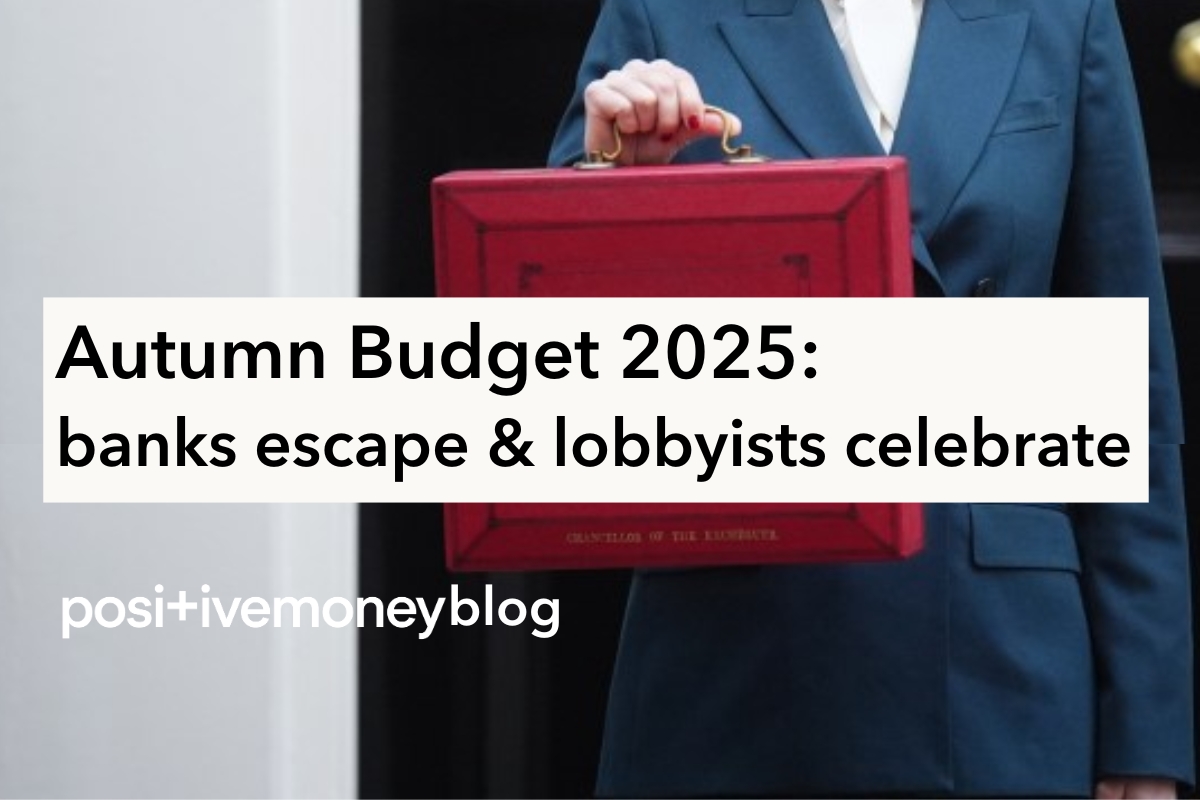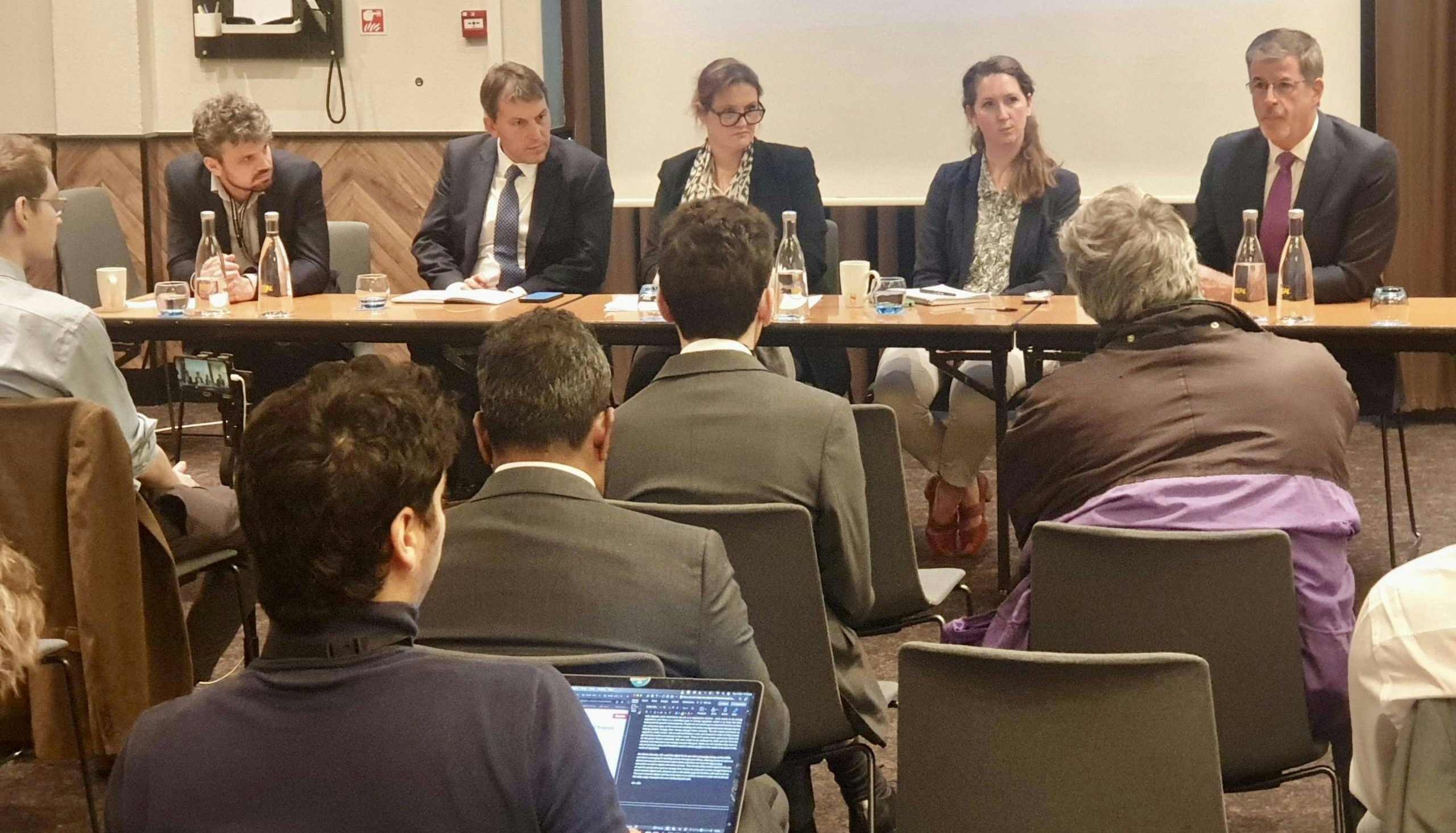
Finance and DemocracyUK
26 November 2025
October 26, 2022
Positive Money has launched a petition to amend the Financial Services and Markets Bill, replacing the harmful ‘competitiveness’ objective for regulators with a new objective to guide banks towards meeting climate goals. You can sign our petition here.
This conference season, Positive Money had the privilege of hosting events on the future of money and banking with MPs at both the Labour and Conservative Party conferences. The events were supported by the Post Office, who play a key role in providing basic banking services and access to cash across the UK.
Setting the scene at the Labour Party Conference and Conservative Party Conference were our Chairs, Kalyeena Makortoff, banking correspondent at the Guardian, and Izabella Kaminska, founder of The Blind Spot.
The first item on the agenda was the government’s promised ‘Big Bang 2.0’ for the financial sector post-Brexit, which relies heavily on deregulation by way of new powers allowing the government to overrule regulators. It also involves the re-introduction of an approach to regulation that was scrapped after the 2008 financial crisis because of its contribution to the crash. The Financial Services and Markets Bill (FSMB), currently going through parliament, puts forward a dangerous objective for regulators which will force them to consider the ‘international competitiveness’ of the firms they regulate when setting and enforcing the rules.
At the Labour Party Conference, Tulip Siddiq, Labour MP for Hampstead & Kilburn and Shadow City Minister, expressed concerns that the interventionary powers government is proposing for itself could compromise the independence of regulators, a fear echoed by Dame Angela Eagle, Labour MP for Wallasey, who decried the ‘draconian powers’ being proposed in the FSMB.
With regards to the ‘competitiveness’ objective, Kalyeena flagged the concerns being raised that this would facilitate a ‘race to the bottom’ for regulators internationally, with the UK and other countries competing to have the lowest standards in order to attract the most investors. Positive Money’s executive director, Fran Boait, added that this deregulatory agenda didn’t happen in isolation: the financial services lobby is one of the most powerful in the country, and pushes hard for the policies it wants.
At the Conservative Party Conference, however, John Glen, Conservative MP for Salisbury and South Wiltshire (and former City Minister/new chief secretary to the Treasury), maintained that the FSMB addresses the gaps left by the UK’s exit from the EU’s regulatory regime ‘in a responsible way’. He revealed that as City Minister he pushed back against attempts to make competitiveness a primary objective, and that he is only in favour of it on the basis of it being a secondary objective for regulators that comes after a core focus on financial stability, which would otherwise be ‘unsound.’
Alongside deregulation, the future of our payments system also played a key role in both conference conversations. Of particular concern was the declining accessibility of cash, despite millions still relying on cash to make payments.
Tulip Siddiq told listeners that access to cash is a hot topic in her constituency, where many people use it to budget, but that measures to protect access to cash are often temporary and, more importantly, don’t explicitly state whether that access will be provided free of charge: a question the FSMB so far fails to answer.
Dame Angela Eagle reiterated the need for transparency in this area, citing measures she helped introduce as part of the Treasury Committee, forcing banks to say upfront on their ATMs whether they were offering cash free of charge, so that the least connected, the poorest and the unbanked aren’t hit with hidden charges when using facilities.
Whilst John Glen likewise expressed a need to make provisions for the most vulnerable, he pointed to a decline in the use of bank branches as justification for the mass closures we’re witnessing on high streets up and down the country.
And yet, the Post Office banking experts who joined us at the conferences — Ross Borkett and Martin Kearsley — both highlighted the sharp increase in people using the Post Office for face-to-face banking services as their bank branches close, illustrated by the record £3.45 billion of cash it handled in August. Kearsley specifically pointed to Bank Hubs — new models being rolled out where different banks can share one branch, hosted by the Post Office — as accelerating its usage as a banking services provider.
Especially optimistic about the future of cash was Borkett, who highlighted the case of Finland, a country that went cashless then had to roll cash back out because people were left behind. He also discussed businesses the Post Office has dealt with which went cashless, but then had to revert to accepting cash because of the higher operating costs of exclusively using card payments.
David Hale, Head of Public Affairs at the Federation of Small Businesses and a panellist at our Conservative Party Conference event, similarly stressed the high costs of card fees faced by small businesses, and explained that they are ultimately led by their customers, some of whom will will always want to use cash, particularly in rural and deprived areas.
With such trusted facilities, Fran made the case for the Post Office to be a provider of public digital money (sometimes called a Central Bank Digital Currency). Borkett supported the idea of the Post Office making use of its physical network to provide a digital version of cash issued by the Bank of England, which lacks the in-person facilities to provide banking services directly itself.
Throughout both discussions, Fran was steadfast on what needs to happen for us to build a money and banking system that works for everyone. Firstly, access to physical cash must be protected, and a digital version of cash must be developed, so that people are able to use public money to make payments online and offline, and aren’t forced to rely on big banks and card companies to meet their payments needs.
Secondly, bank lending must be directed towards the places we need it most: small and medium sized businesses, who supply 60% of private sector jobs but only receive 2-5% of bank lending. We also urgently need finance for the green transition, which will allow us to wind down the use of fossil fuels across our economy. This is in stark contrast with where bank lending is going now: speculation on volatile fossil fuels and property, sending the cost of living upwards. And whilst John Glen assured us that Rishi Sunak’s work to make the UK the world’s first net zero financial centre will continue, Fran pointed to delays in releasing the Green Finance Strategy as an omen that the government may not follow through with these commitments.
Finally, in order to create a money and banking system that works for everyone, we need a more diverse banking ecosystem, with a greater role for publicly owned banks, mutuals and other stakeholder banks, who care about their social impact and prioritise lending to small and medium businesses. Not only would this break up the monopolies of big banks, forcing them to offer people better services in a bid for their custom, it would also ensure that the public has a say in how their money is invested. With a money and banking system that puts people, the environment and the real economy first, we can channel funds towards serving the public good, rather than maximising profits for shareholders.
Positive Money has launched a petition to amend the Financial Services and Markets Bill, replacing the harmful ‘competitiveness’ objective with an objective to meet climate goals, which you can sign here.
Notes:


